There are many benefits to establishing local food systems. Connecting people with fresh, local food not only improves overall physical and mental health but also motivates consumers to care more about how their food is produced and its environmental impact.
At Ceres, the team's favorite projects are those where their greenhouses provide fresh food year-round to communities that would otherwise rely on imported produce.
"One such project we are particularly proud of is the energy-efficient aquaponic greenhouse we designed for the Forest County Potawatomi tribal community in northern Wisconsin. The greenhouse not only provides a consistent supply of fresh, nutritious greens but also plays a crucial role in promoting food sovereignty for the tribe."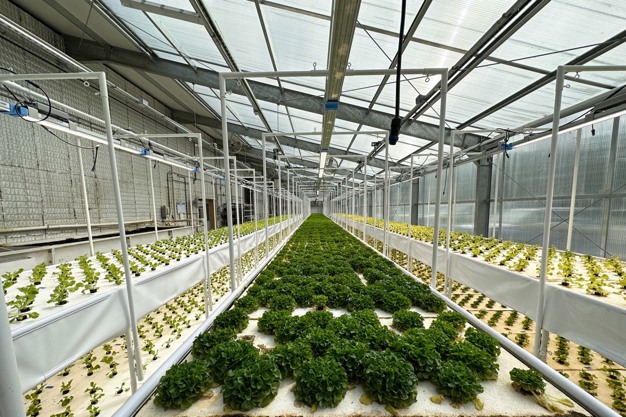
What is food sovereignty?
Food sovereignty is the right of people to have access to healthy and culturally appropriate food produced through ecologically sound and sustainable methods, and their right to define their own food and agriculture systems. "For tribal communities, food sovereignty is especially significant as it allows them to reclaim control over their food sources, preserve their cultural heritage, and enhance their economic resilience."
In this blog, Ceres will explore the success story of the Forest County Potawatomi tribe's aquaponic greenhouse, showcasing how this solution has empowered the community, improved their food security, and set an example for other tribal communities seeking to establish local, sustainable food systems.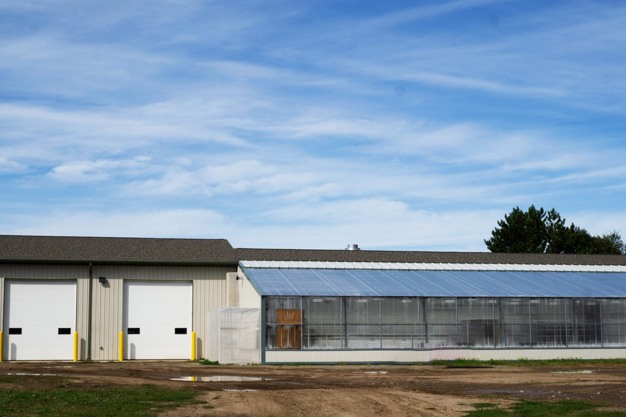
The greenhouse was attached to a facility that is used for food processing and distributing, storage, office space, and classroom space
The Forest County Potawatomi community
The Forest County Potawatomi (FCP) have resided in Forest County, Wisconsin, since the late 1800s, with settlements around Blackwell, Wabeno, Carter, and Crandon. Currently, the FCP is the largest employer in Forest County, with income from various tribal businesses supporting investments in health, wellness, education, the environment, and the future of their community.
Bodwéwadmi Ktëgan is a farm owned by the Forest County Potawatomi, aiming to, "provide a natural, sustainable source of vegetables, fruits, greens and animal proteins to the tribal community. All products are available to the members of the tribe and general public."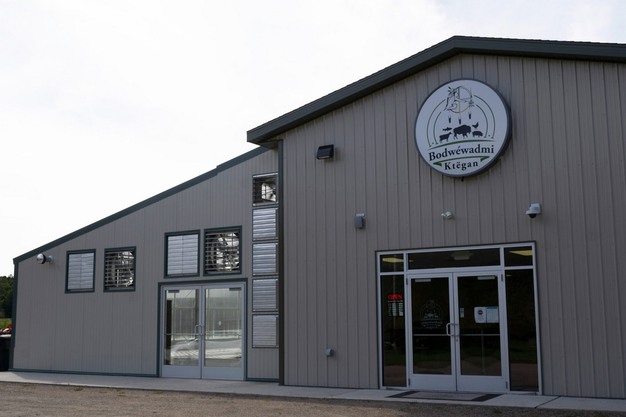
The insulated east wall of the greenhouse connected to the farm's retail store where you can purchase local and fresh produce, bison, beef, and eggs
Launched in spring 2017 at the former red deer ranch in Blackwell, WI, Bodwéwadmi Ktëgan embodies the tribe's mission to ensure access to healthy, sustainable food sources for their community.
The Potawatomi Farm first reached out to Ceres Greenhouse Solutions in 2018 with a desire for a year-round food-producing greenhouse to connect to a larger facility that houses a food processing and distribution center, a cold storage room, a community space, a farm store, and office space. Northern Wisconsin is known for cold, gray, and snowy winters, which required Ceres to come up with a custom design that would meet the specific needs of the farm and its climate.
The aquaponic greenhouse solution
Ceres designed a 3,000 sq ft (30' x 100′) passive solar greenhouse built with heavy-gauge steel to withstand the wind and snow loads of a Wisconsin winter.
The design features a ground-to-air heat transfer system (GAHT) for heating and cooling, and triple-wall polycarbonate glazing on the south-facing roof and wall of the greenhouse to ensure maximum efficiency and durability.
The growers at Potawatomi Farms were eager to integrate an aquaponics system into their greenhouse to embrace a more sustainable method of cultivation and enhance their farm's productivity. "We connected the Forest County Potawatomi with The Aquaponics Source, our trusted partners in aquaponics systems, to bring this exciting project to life."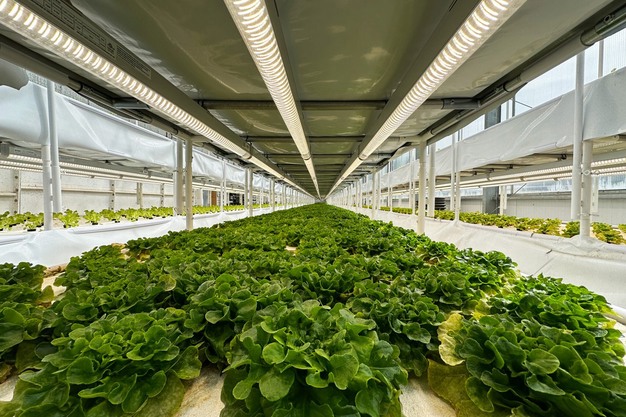
Production numbers
"In order to properly portray the success of the The Potawatomi Farm Aquaponic community greenhouse, we're sharing the evolution of the aquaponic system setup and the leafy greens production numbers that ensued."
2019 – The original deep water culture trough setup allowed for 4,700 heads of lettuce to be planted at one time. With the time from transplanting to harvesting being four weeks, the original system could produce approximately 60,000 a year or 1,100 heads a week.
2023 – Due to the success of the production program and expansion into other communities, FCP decided to increase production in the spring of 2023. The original ground mounted deep water culture troughs were removed and replaced with three double decker troughs. This upgrade amounted to an increase of close to 90,000 heads annually or about 1,750 heads weekly.
Ceres and The Aquaponics Source are working with FCP to bring a second aquaponics greenhouse to life to produce even more leafy greens for the community. The new greenhouse will have three double decker deep water culture troughs in addition to the fish system. This system is expected to produce approximately 75,000 heads a year which is roughly 1,400 heads a week and anywhere from 800 to 1,000 lbs of fish per year.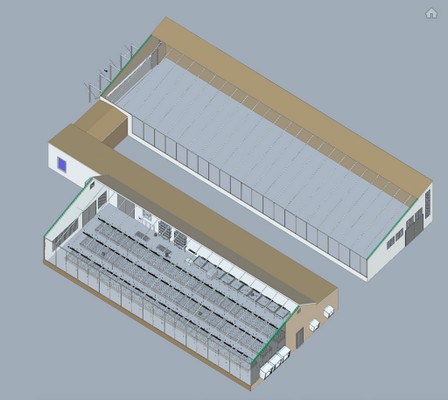
This render shows where the new greenhouse (bottom left) will be built in relation to the original greenhouse
Tribal Elder Box Program
One of the reasons FCP has increased their leafy greens production in recent years is due to their contribution to The Tribal Elder Food Box Program. This non-profit initiative partners with over 30 indigenous and non-indigenous producers (FCP included) to provide food to elders aged 55 and up from 12 federally recognized tribes in Wisconsin.
Traditional emergency food box items for tribal elders like milk and cheese can worsen existing chronic illnesses and do not align with health-promoting indigenous foods. The Tribal Elder Food Box Program (TEFBP) aims to restore indigenous food-ways and access to culturally appropriate, locally sourced, and traditional products grown by indigenous producers.
By selling a portion of their greens to TEFBP, FCP is simultaneously supporting the economic development of their community farm and indigenous food networks across Wisconsin.
To learn more about TEFBP, watch the video below highlighting the program and all the producing partners.
Year-round solutions and food sovereignty
"Complete food sovereignty is an ambitious but worthwhile goal for most rural and tribal communities, and it can be particularly challenging to achieve. However, as demonstrated by the Tribal Elder Food Box Program, building a robust food network with other local communities can help achieve this goal by providing access to a diverse array of fresh and healthy foods," the Ceres team says.
"We are honored that the greenhouse we designed for Potawatomi Farms is playing a crucial role in delivering nutritious food to the Forest County Potawatomi community and to tribal elders across Wisconsin. This project not only supports local food sovereignty but also sets a powerful example for other communities. We eagerly anticipate the launch of FCP's second aquaponic greenhouse and look forward to collaborating on more community greenhouse projects in the future."
For more information: Ceres Greenhouse Solutions
Ceres Greenhouse Solutions
info@ceresgs.com
www.ceresgs.com
